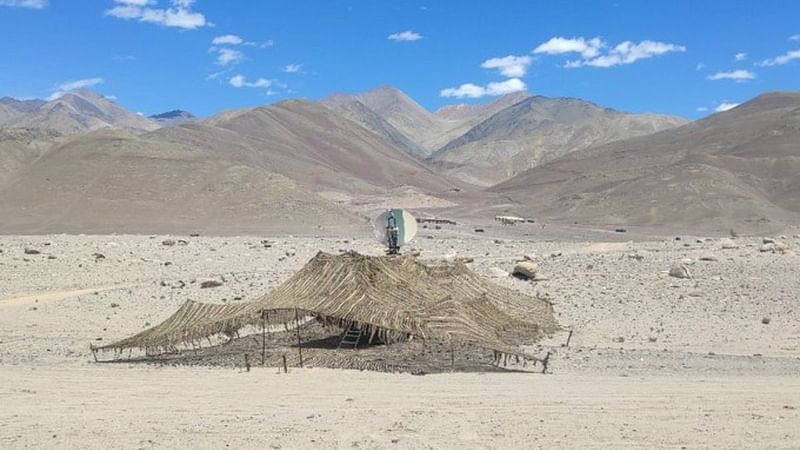
Amid India-China tensions, Army conducts exercise ‘Skylight’ to test satellite-based systems
Don't Miss
The exercise not only validated protocols to switch completely to satellite-based communication in case of a conflict but also brought to light key lacunae in the systems.
 |
| Transportable Satellite Terminals of the Indian Army to provide secure and reliable voice, video & data connectivity to troops deployed in forward areas | Twitter | @adgpi |
SNEHESH ALEX PHILIP, The Print, 5 August 2022, New Delhi: The Indian Army conducted a pan-India exercise to test and validate its entire satellite-based communication network to ensure operational readiness in case of a conflict in the future.
Called ‘Skylight’, the exercise was conducted from 25 to 29 July.
Sources in the defence and security establishment said the exercise involved all kinds of satellite communication, from the Andaman and Nicobar Islands to Ladakh, where India and China have engaged in a military stand-off for the past two years.
Sources also said the exercise not only validated protocols to switch completely to satellite-based communication in case of a conflict but also brought to light key lacunae in the systems, especially in the context of a situation arising with China.
“Conflict situations demand space-based communication because we are going by the assumption that the primary means of communication — terrestrial media — gets disrupted,” a source said, on the condition of anonymity.
Sources said that during the operation, multiple satellite bands were used to communicate and also transfer data.
The assets that were put to test included the static satellite communication systems, the vehicle laden transportable ones and also the man portable systems for their voice and data capability.
“Satellite communication is the back-up as well. Tomorrow, due to any kind of disruption, it is important for our surveillance systems to also work on the satellite band,” a second source said.
“Our northern borders are primary areas of concern. Given the terrain and landscape of the northern areas, it is essential for space based communication,” the source added.
Military-grade satellite for Army
The Army currently does not have a dedicated satellite but depends on several launched by the Indian Space Research Organisation.
In March this year, the Defence Acquisition Council (DAC), the key procurement panel chaired by Defence Minister Rajnath Singh, had accorded Acceptance of Necessity (first step of procurement) for the indigenously designed, developed and built GSAT 7B, which will be a state-of-the-art, multiband, military-grade satellite for the Army.
Sources explained that the GSAT 7B satellite, which has been a long pending demand of the Army, will be launched by 2025 and provide integrated communication, not just within the force but also the other two services — Indian Navy and Indian Air Force (IAF).
The satellite will cost Rs 4,635 crore and there would be two units of it. One would be operationalised in space while the other on ground.
Asked what happens if the Chinese are able to shoot down the dedicated Army satellite, one of the sources cited above said there are backups in place and communication switches from one satellite to another.
In November last year, the DAC had cleared IAF’s proposal for the GSAT-7C satellite. The force currently uses GSAT-7A (also known as ‘Angry Bird’), which was launched in 2018. While this is a dedicated satellite for the IAF, the Army uses about 30 per cent of its capacity.
The satellite connects various IAF platforms like aircraft, choppers, drones, airborne early warning and control systems and radars, among others.
This was the second dedicated satellite for the Indian military after the GSAT-7, which was launched in 2013 for the Navy. Known as Rukmini, the GSAT-7 is the primary communication link for all naval operations and a replacement for it is being worked upon. This is because the lifespan of GSAT-7 will be over in the next couple of years.
The ISRO will be launching a few more military satellites in the coming months that will be focussed on surveillance, sources said. India currently uses the CARTOSAT and RISAT series of satellites for this purpose.



0 Response to "Amid India-China tensions, Army conducts exercise ‘Skylight’ to test satellite-based systems"
Post a Comment
Disclaimer Note:
The views expressed in the articles published here are solely those of the author and do not necessarily reflect the official policy, position, or perspective of Kalimpong News or KalimNews. Kalimpong News and KalimNews disclaim all liability for the published or posted articles, news, and information and assume no responsibility for the accuracy or validity of the content.
Kalimpong News is a non-profit online news platform managed by KalimNews and operated under the Kalimpong Press Club.
Comment Policy:
We encourage respectful and constructive discussions. Please ensure decency while commenting and register with your email ID to participate.
Note: only a member of this blog may post a comment.